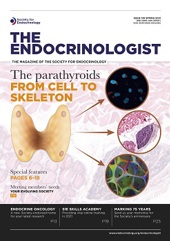Simulation-based medical education (SBME) is increasingly becoming recognised amongst healthcare students and professionals. SBME can be defined as an educational activity, using simulation to replicate a clinical scenario.1 Providing an alternative to real patients allows trainees to develop their knowledge, skills and attitudes in a comfortable environment, without putting patients at unnecessary risk.2
‘Simulation via Instant Messaging – Birmingham Advance’ (SIMBA) incorporates SBME into medical teaching.3 The aim of SIMBA is to create simulations based on real life situations, using minimal and existing resources to improve healthcare professionals’ confidence. It is a global initiative created by Punith Kempegowda and Eka Melson from the University of Birmingham’s Institute of Metabolism and Systems Research and led by medical students and junior doctors. The model utilises free and easily accessible platforms – WhatsApp and Zoom – enabling international participation.

The SIMBA team and steering committee
Transcripts are created based on real life scenarios, starting from history and examination, through to investigations and management plans. Participants then work through these simulated cases, moderated mostly by medical students. At the end of the session, participants and moderators join an interactive Zoom call, where an expert discusses the most important aspects of each case, focusing on the rationale for decision making. Participants interact and ask questions pertinent to the cases and consolidate their knowledge during this discussion. A certificate of attendance is linked to the end of the feedback survey. Feedback on performance, based on an adapted version of the global rating scale, is sent to all participants within a week of the session.
SIMBA INCREASES CONFIDENCE
From 3 July 2019 to 3 October 2020, six successful SIMBA sessions were held on different aspects of endocrinology or diabetes. These included Pituitary 1.0, Diabetes 1.0, Adrenal, Thyroid, Pituitary 2.0 and Diabetes 2.0. Participants completed pre-SIMBA and post-SIMBA questionnaires, rating their confidence levels on the management of clinical cases, related to the respective session topics. Confidence levels were measured using a Likert scale ranging from strongly disagree to strongly agree. Participants also provided qualitative feedback via open-ended questions on the competency areas they improved on.

Changes in confidence levels before and after SIMBA across six different sessions. Credit: SIMBA
The responses were anonymised, combined and categorised into three categories: (i) confident (strongly agree, agree), (ii) unsure (agree somewhat, undecided and disagree somewhat), (iii) non-confident (disagree, strongly disagree). Results were analysed using Stata, to compare trainees’ confidence levels pre- and post-simulation. The results are reported using percentages and displayed in bar charts (see Figure).
There was an overall significant improvement in trainees’ self-reported confidence levels in all six sessions. The sessions Adrenal, Thyroid, Pituitary 2.0 and Diabetes 2.0 showed statistically significant improved confidence levels (P<0.0001), as did Pituitary 1.0 and Diabetes 1.0 (P=0.0002).
SIMBA IMPROVES KNOWLEDGE
Common themes identified from open-ended questions on the areas that participants had improved upon post-session were patient care, knowledge of patient management and practice-based learning. Overall, our participants felt more confident in ordering relevant investigations, and taking a systematic and individualised approach to managing specific cases.
Medical students as moderators also benefited from the sessions. Acting as a moderator allows students to familiarise themselves with the structure of taking an effective history and suggesting relevant examinations, investigations and management plans.
OTHER BENEFITS OF SIMBA
As well as developing medical knowledge, SIMBA promotes teamwork and leadership skills amongst medical students. Each specialty stream within SIMBA consists of a core moderator team. Within the team, a stream lead will oversee the roles of other members, encouraging decision making and mentorship. Each team member has a specific allocated role, working towards a set deadline. Attentive and consistent communication is required, to ensure conformity is reached across the team. Time-management skills are developed through the need to prioritise tasks and work co-operatively to ensure deadlines are met.
Students also lead moderator-training sessions, which is a chance to further develop their communication skills. Efficient planning and co-ordination are necessary to ensure sessions run smoothly and any difficulties are raised and resolved. Students are further encouraged to provide feedback and constructive criticism, enabling peer learning and teaching.
'Medical students’ feedback revealed they felt self-assured in seeking new leadership and team roles within their medical school as a result of SIMBA.'
Medical students’ feedback revealed they felt self-assured in seeking new leadership and team roles within their medical school as a result of SIMBA. They felt more confident in working with senior colleagues, articulating their thoughts and communicating with clarity. The use of online platforms such as WhatsApp and Zoom has eased students into utilising online communication for medical education. It also promotes international collaboration, with the SIMBA team consisting of 30 moderators from eight different countries.
Overall, SIMBA has proved to be an effective example of simulation-based learning in medical education for both medical trainees and students. Medical trainees’ confidence in interpreting and managing clinical scenarios has significantly improved, whilst medical students feel more confident in both their clinical knowledge and professional self-development. These aspects are all transferable to future medical practice in providing optimal patient care.
You can find out more about SIMBA at https://sites.google.com/view/simbasimulation. And read about SIMBA's sister project, CoMICs, in this accompanying article in The Endocrinologist.
ANISAH ALI
3rd Year Medical Student, University of Birmingham Medical School
DENGYI ZHOU
4th Year Medical Student, University of Birmingham Medical School
PUNITH KEMPEGOWDA
Honorary Specialist Training Registrar in Endocrinology, Diabetes and General Internal Medicine, University Hospitals Birmingham NHS Foundation Trust, and Wellcome Trust Clinical Research Fellow, Institute of Metabolism and Systems Research, University of Birmingham
on behalf of the SIMBA team
REFERENCES
- Al-Elq A 2010 Journal of Family & Community Medicine 17 35.
- Lateef F 2010 Journal of Emergencies, Trauma & Shock 3 348.
- Melson E et al. 2020 BMC Medical Education 20 274.







